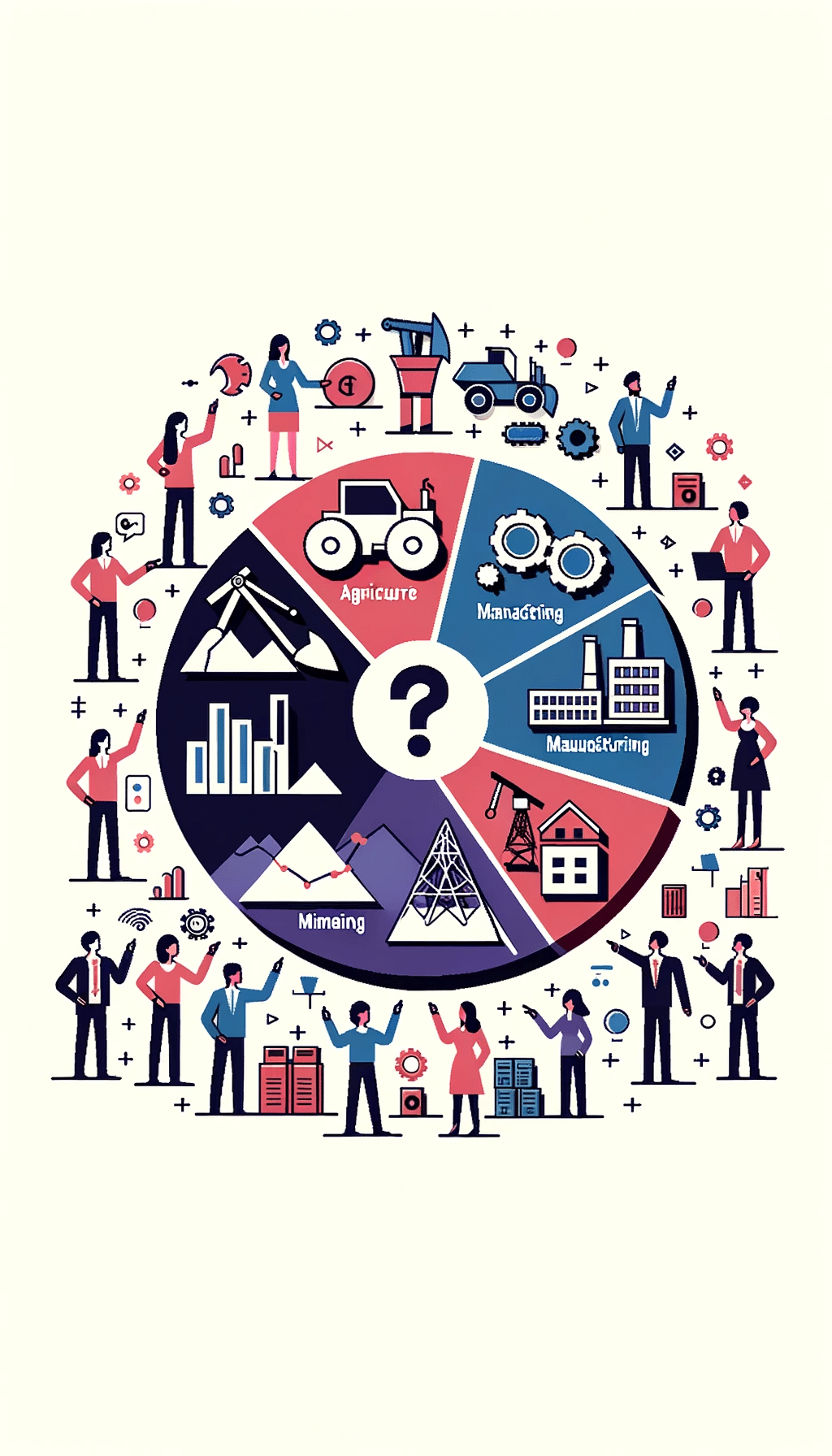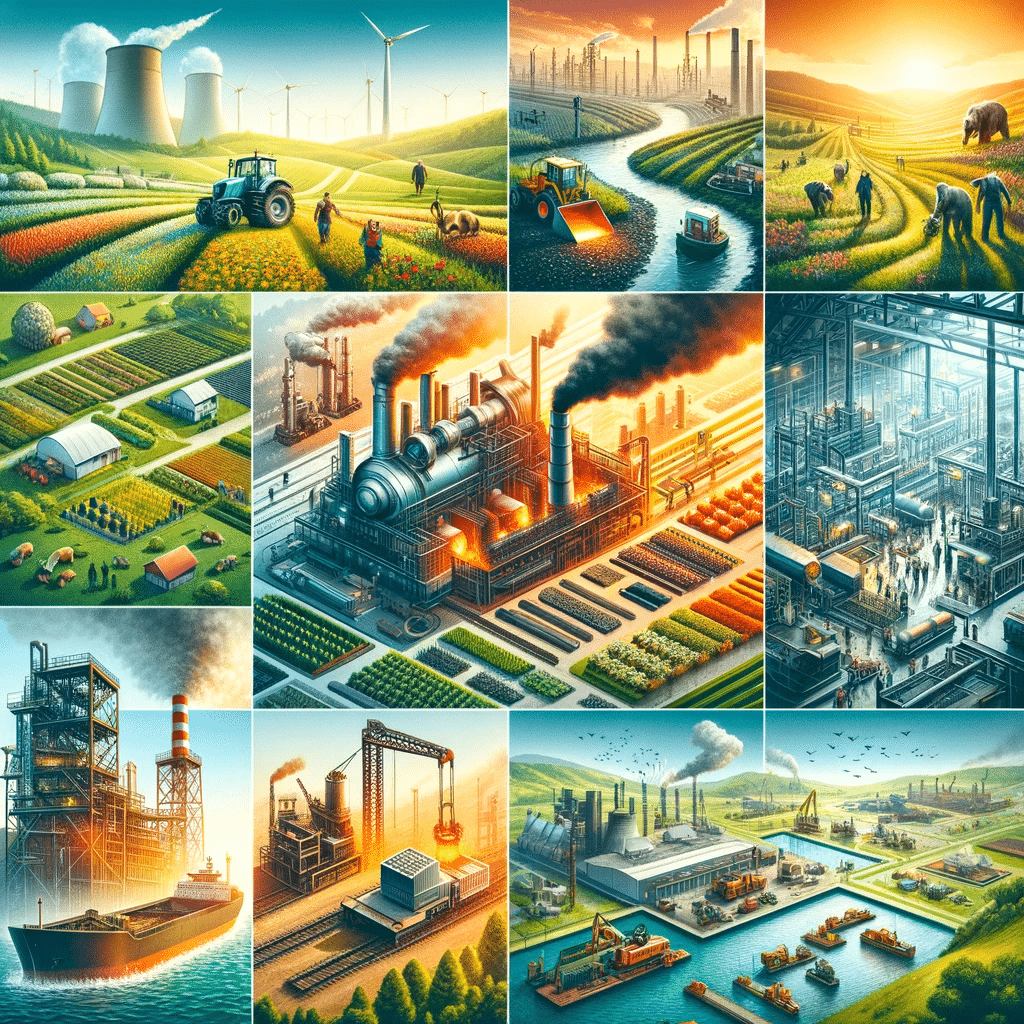Basic Industries have long been the pillars of the global economy, playing a pivotal role in shaping nations' economic landscapes. These industries, encompassing sectors like mining, agriculture, oil, and steel, are not only crucial for production but also serve as significant employment generators.
As the world continues to evolve, with technological advancements and shifting economic paradigms, the question arises: How many jobs are available in basic industries today?
This guide delves deep into the employment landscape of basic industries, offering insights, data, and trends for those keen on exploring opportunities in this robust sector.
Finding a job in the basic industries can be overwhelming with so many applications, deadlines, and resumes to manage. Many job seekers struggle to stay organized and ensure their resumes stand out in such competitive fields.
You can take advantage of Tools like Huntr solve this problem by offering features like an AI-powered Resume Builder and Job Application Tracker, helping you stay on top of your applications and create resumes that get noticed by employers.

Craft the Perfect Resume with AI
Understanding Basic Industries
Basic industries Companies, often termed the backbone of economies, encompass a diverse range of sectors that are foundational to our daily lives and the broader economic framework. But what exactly constitutes basic industries?
-
- Definition: At its core, basic industries refer to sectors that produce or extract raw materials. These materials are then used either directly by consumers or serve as inputs for other industries.
-
- Importance: The significance of basic industries extends beyond mere production. They influence trade balances, determine commodity prices, and play a pivotal role in shaping a nation's economic health.
Key Sectors within Basic Industries:
-
- Oil: A primary energy source, oil powers industries, vehicles, and even homes. Its global demand and supply dynamics often influence geopolitical strategies.
-
- Steel: An essential construction material, steel's demand often serves as an economic indicator, reflecting infrastructure development and growth.
-
- Mining: Beyond just extracting precious metals, mining includes coal, a significant energy source, and other minerals crucial for various industries.
-
- Agriculture: Perhaps the oldest of basic industries, agriculture not only provides food but also raw materials for sectors like textiles.
-
- Others: This includes sectors like paper and pulp, chemicals, and more, each with its unique significance and contribution.
For those keen on diving deeper into market dynamics and understanding the competitive landscape of these sectors, resources like Conducting Market Research 101 and Competitive Landscape Analysis offer invaluable insights.
How many jobs are available in basic industries ?

According to the U.S. Bureau of Labor Statistics, as of September 2024, the United States reported a total of approximately 901,000 employment positions across all basic industries, including sectors like mining, logging, construction, and manufacturing.
The basic industries sector, encompassing a diverse range of fields from agriculture to manufacturing, plays a pivotal role in the U.S. employment landscape.
Furthermore, projections indicate a promising future, with an anticipated growth of 2.7% over the next eight years. Let's delve deeper into the specifics of these numbers:
A Closer Look at the Employment Figures
-
- Agriculture and Forestry: A cornerstone of basic industries, agriculture and forestry continue to be primary sources of livelihood, especially in rural regions. As of 2022, this sector provides employment to approximately 2.3 million individuals.
-
- Mining and Logging: Despite facing environmental and sustainability challenges, the mining and logging sector remains resilient, offering close to 600,000 job opportunities.
-
- Construction: Serving as a testament to the nation's growth and development, the construction sector is a significant employer. With nearly 7.4 million individuals on its payroll, it underscores the sector's importance in the employment landscape.
-
- Manufacturing: A diverse and expansive sector, manufacturing is home to a myriad of sub-industries, from electronics to textiles. As of the latest data, it employs around 12.3 million people, making it one of the largest employers within basic industries.
-
- Utilities: Ensuring that homes and industries run smoothly, the utilities sector, though smaller in comparison, plays a crucial role. With an employment figure of approximately 550,000, it remains an essential part of the basic industries framework.
Growth Trajectory: What's on the Horizon?
While the current employment figures are impressive, the future looks even brighter. The anticipated 2.7% growth over the next eight years signifies the sector's resilience and adaptability. Factors such as technological advancements, sustainable practices, and evolving consumer demands are expected to shape the employment landscape in basic industries.
Diverse Job Roles in Basic Industries
The realm of basic industries is vast, encompassing a multitude of sectors that drive the backbone of our economy. Within these sectors lies a plethora of job roles, each unique in its responsibilities and significance. From the fields of agriculture to the high-tech environments of manufacturing plants, the opportunities are diverse and abundant.
A Spectrum of Opportunities
Basic industries, by their very nature, are foundational. They extract, produce, and distribute the essential materials and resources that fuel other industries and our daily lives. This foundational characteristic translates into a wide variety of job roles:
-
- Resource Extraction: This involves roles that are at the very beginning of the production chain. Miners extracting coal, geologists identifying mineral deposits, and loggers felling trees are all part of this category. Their work ensures that raw materials are available for processing and production.
-
- Production: Once raw materials are extracted, they need to be processed and transformed. This is where roles in production come into play. From factory workers in manufacturing plants to engineers overseeing the production of steel, these individuals ensure that raw materials are transformed into usable products.
-
- Distribution: After production, the final products need to reach consumers and businesses. This involves roles in logistics, transportation, and sales. Truck drivers transporting goods, warehouse managers ensuring efficient storage, and sales representatives connecting products with consumers are all integral to this process.
For those keen on exploring the intricacies of these roles and understanding the market dynamics, the article How to Do Market Research for a Startup in 2023 offers valuable insights.
Additionally, if you're interested in potential earnings in these roles, the article on Best Paying Jobs in Basic Industries provides a comprehensive breakdown.
Factors Influencing Job Availability in Basic Industries
The availability of jobs within basic industries is influenced by a myriad of factors. These factors, ranging from global economic trends to rapid technological advancements, play a crucial role in shaping the employment landscape of these foundational sectors.
Economic Trends and Their Impact
The global economy is a complex web of interconnected systems, and any fluctuation can ripple through various sectors, including basic industries.
-
- Recessions and Economic Downturns: During economic downturns, there's often a reduced demand for raw materials due to decreased production and consumer spending. This can lead to layoffs and reduced hiring in sectors like mining, manufacturing, and agriculture.
-
- Economic Booms: Conversely, periods of economic growth can lead to increased production, driving up the demand for raw materials and, consequently, job opportunities in basic industries.
-
- Global Trade Dynamics: Trade agreements, tariffs, and geopolitical tensions can influence the export and import of raw materials, impacting job availability in sectors reliant on global trade.
Technological Advancements
The wave of technological innovation has left no industry untouched, and basic industries are no exception.
-
- Automation and Robotics: The rise of automation, especially in manufacturing, might reduce the need for certain manual labor roles. However, it simultaneously creates jobs in areas like robotics maintenance, software development, and system monitoring.
-
- Agritech: In agriculture, technological advancements such as drone monitoring, precision farming, and genetically modified crops have led to the emergence of specialized roles, requiring expertise in both agriculture and technology.
-
- Green Technologies: As industries pivot towards sustainability, there's an increasing demand for professionals skilled in green technologies, from solar panel installation to waste management solutions.
Global Challenges and Their Influence
The global landscape is rife with challenges that directly or indirectly influence job dynamics within basic industries.
-
- Climate Change: As the world grapples with the effects of climate change, there's a push towards sustainable and eco-friendly practices. This might reduce jobs in sectors deemed harmful to the environment, like coal mining, but simultaneously boost opportunities in renewable energy sectors and sustainable agriculture.
-
- Geopolitical Tensions: Conflicts and tensions between nations can disrupt global supply chains, affecting industries reliant on imports or exports. For instance, a conflict in a major oil-producing region can impact job availability in the global oil and gas sector.
-
- Health Crises: Global health crises, like the COVID-19 pandemic, can disrupt production and trade, leading to job losses. However, they can also create opportunities in sectors like pharmaceuticals and medical equipment manufacturing.
Understanding these factors is essential for anyone looking to navigate a career within basic industries, ensuring they're well-equipped to adapt to the ever-changing employment landscape.
Future Prospects: What's Next for Jobs in Basic Industries?
The landscape of basic industries is ever-evolving, influenced by global trends, technological advancements, and societal needs. As we look toward the future, several key trends and factors emerge that will shape the job market in these foundational sectors.
Predictions and Trends for the Future Job Market
The world is undergoing rapid changes, and basic industries are at the forefront of this transformation. Several predictions can be made about the future job market in these sectors:
-
- Shift Towards Renewable Energy: As the global community becomes more conscious of environmental sustainability, there's likely to be a significant shift from fossil fuels to renewable energy sources. This transition will create a plethora of job opportunities in sectors like solar and wind energy.
-
- Increased Demand for Sustainable Agriculture: With the global population on the rise and the effects of climate change becoming more pronounced, there's a growing need for sustainable agricultural practices. This will lead to increased job opportunities in agritech, organic farming, and sustainable food production.
-
- Technological Integration: The integration of technology into traditional industries will continue to grow. Whether it's the use of AI in mining or the Internet of Things (IoT) in manufacturing, technology will play a pivotal role in shaping the job market.
The Role of Sustainability and Green Practices
Sustainability is no longer just a buzzword; it's a necessity. As industries pivot towards green and sustainable practices, the job market will reflect this change:
-
- Green Manufacturing: Traditional manufacturing processes are being revamped to reduce carbon footprints. This shift will lead to job roles focused on sustainable production, waste management, and eco-friendly practices.
-
- Eco-friendly Construction: The construction sector will see a rise in demand for professionals skilled in green building practices, sustainable architecture, and eco-friendly materials.
Opportunities for Upskilling and Reskilling
The rapid pace of technological advancements means that continuous learning is more crucial than ever:
-
- Training Programs: Many industries will offer training programs to help employees adapt to new technologies and practices. Whether it's learning about new agricultural technologies or understanding the nuances of renewable energy, upskilling will be essential.
-
- Online Courses and Certifications: With the rise of online education platforms, professionals can easily access courses and certifications to enhance their skills and stay relevant in the job market.
Basic industries have long been the bedrock of our global economy, playing a pivotal role in shaping nations, driving progress, and fostering innovation. Their significance extends far beyond the production of raw materials and goods; they are instrumental in generating employment opportunities for millions worldwide.
As we've explored throughout this article, the landscape of basic industries is vast and diverse, encompassing sectors from agriculture to manufacturing, from mining to renewable energy. Each sector offers a plethora of job roles, catering to a wide range of skills and expertise. Whether it's the hands-on work of a miner extracting valuable resources or the strategic insights of a renewable energy consultant shaping the future of energy, the opportunities are abundant and varied.
Moreover, the future prospects for jobs in basic industries are promising. With the world pivoting towards sustainability, technological integration, and green practices, new avenues are opening up. These evolving dynamics present both challenges and opportunities, requiring professionals to adapt, upskill, and reskill to stay relevant.
For those contemplating a career move or just starting their professional journey, basic industries offer a robust and resilient sector to delve into. The stability, growth potential, and sheer diversity of roles make it an attractive choice for many.
In conclusion, as we stand at the crossroads of technological advancements and global challenges, basic industries remain a beacon of opportunity. For those willing to embrace change, learn continuously, and drive innovation, the future is bright. We encourage our readers to explore the myriad job opportunities in this sector, armed with knowledge and a passion for making a difference.
Frequently Asked Questions (FAQs)
What is the definition of basic industry?
Is basic industries a good career path?
how many jobs are available in basic industries ?
A quick overview of the topics covered in this article.
Latest Posts
February 28, 2026
February 28, 2026
Subscribe to our newsletter
Get valuable insights and business guidance sent to your email.










